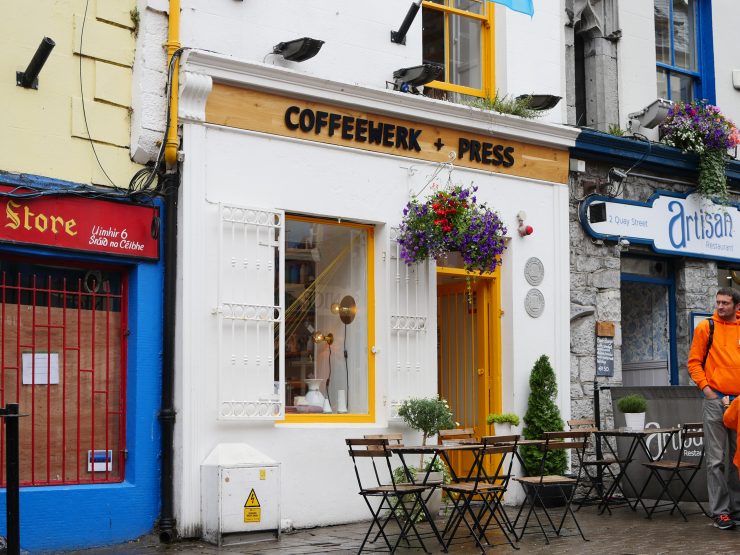
I rarely stumble upon a beautiful cafe by chance. One perk of working for Sprudge is getting tapped into a global network of coffee professionals, making it pretty easy to find good coffee no matter where I travel. When it does happen by accident, it is serendipitous. It’s as though I were delivered to that cafe by some coffee deity, a single set of footprints carrying me at my most under-caffeinated. And so it was finding Coffeewerk and Press in Galway. Happening upon this Scandinavian-leaning oasis of coffee and design during an impromptu post-World Barista Championship trip to Ireland’s western coast was a glorious gift from on high.
Located on the cobbled and often dewy Quay Street, Coffeewerk and Press is surrounded by shops and attractions unlike itself; the narrow street is chock full of knottily adorned “The So-and-So and So-and-So” pubs, Aran sweater shops, and street entertainers. The atmosphere is electric if not a little touristy. Amid all this foofaraw, Coffeewerk’s 450-year-old yellow-and-white building stands out for its simplicity.
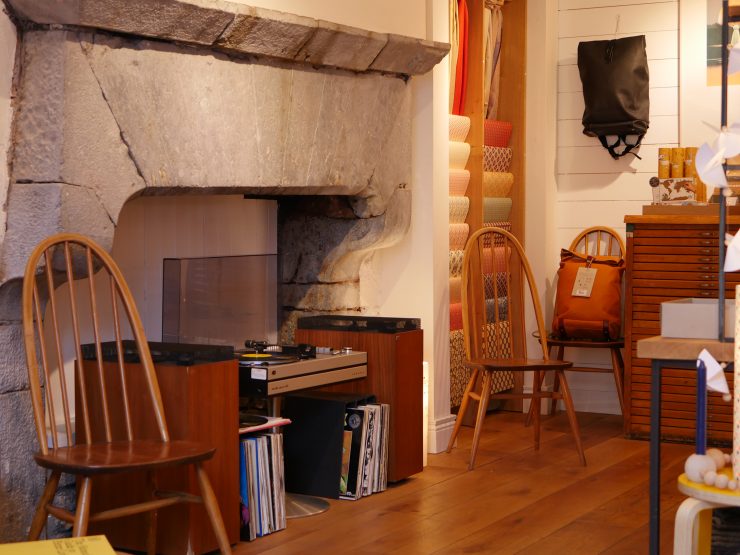
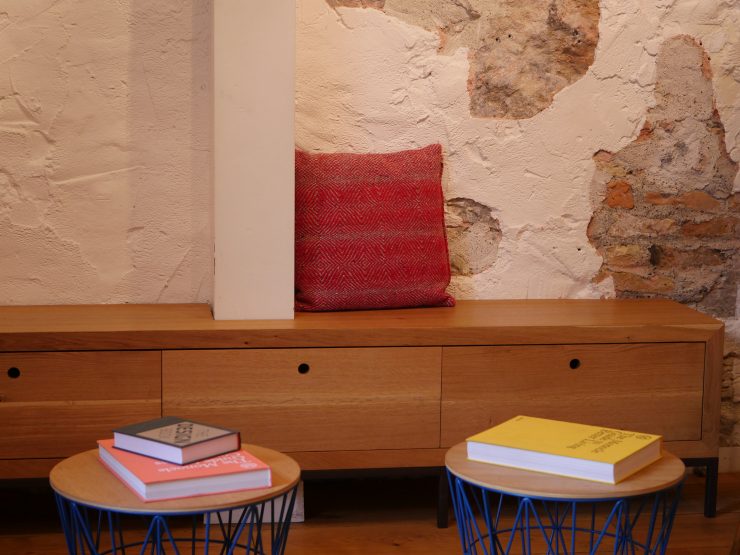
Inside the building, the aesthetic is cohesive and calm. All the walls are matter-of-factly white, with the shelving and coffee bar being comprised of only two materials: French oak and steel. Neither are painted, but instead are treated with an organic oil to “show the honesty of the materials,” as owner Daniel Ulrichs describes it. The white walls, French oak, and steel are staples of each of Coffeewerk’s three floors, used in different measure to create three distinct but complementary areas.
The first floor serves as the coffee bar and showroom for handcrafted sundries as well as postcards made by Ulrichs’ yet-to-be-named printing company (run from the fourth floor). There’s no seating on the first floor. It’s a gentle nudge to customers waiting for coffee to explore the shop’s wares, thereby introducing them to Coffeewerk’s thesis. “[It’s] a space created to showcase the overlap between Irish and international design and art while exploring the world of specialty coffee,” Ulrichs explains, “a place to create a dialogue between design, coffee, and the community.”
This dialogue continues upstairs on the second and third floors in a more design-forward way. Though also home to Coffeewerk’s limited seating—a small bench here, a nice window ledge nook there—these floors serve ultimately to display additional works from the printing company’s international cadre of artists as well as craft-focused homewares from around the world, all hand-selected by Ulrichs. Items like hanging light fixtures, ceramics, and a variety of niche coffee table books can all be found on the well-curated upper floors, creating a laid-back atmosphere for enjoying a coffee and a pastry or a quiet conversation with a friend.
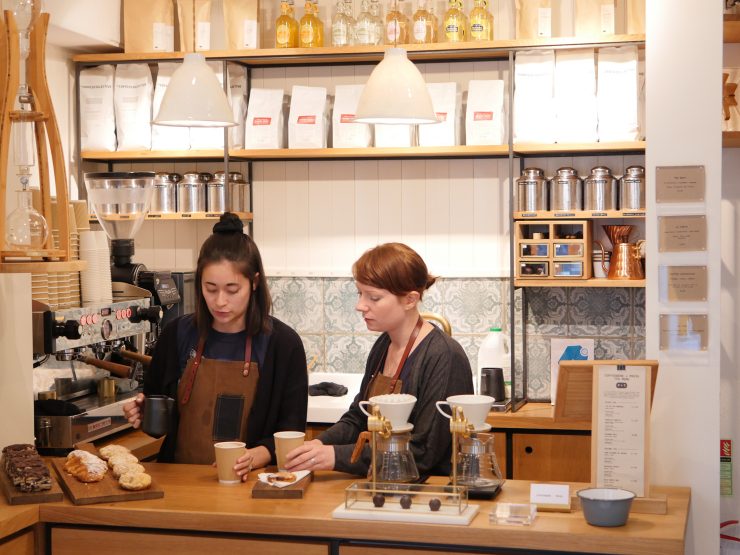
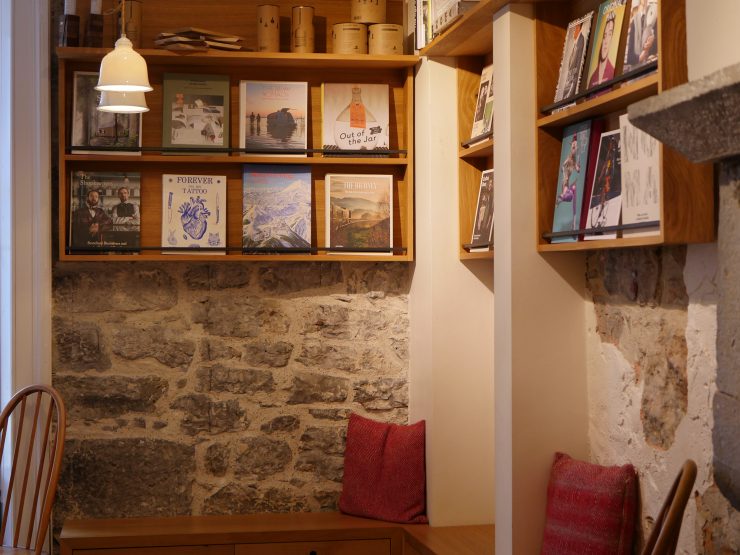
Back on the first floor, the coffee bar continues the international feel but focuses heavily on Scandinavian coffee culture, a gesture present in the layout. The workspace is small, the bar top is uncluttered and open—only two Kalita Wave brewers have a permanent home on the front bar. The remaining equipment—a two-group La Marzocco Linea PB, a Nuova Simonelli Mythos One Clima-Pro espresso grinder, a Mahlkönig EK 43 pour-over grinder—is couched along the side bar, shifting the focus towards the manual brew station. It’s a physical representation of a very Nordic, filter-forward approach to coffee.
Inside the hoppers, Denmark’s The Coffee Collective anchors the multi-roaster coffee program, though it was by chance that the Scandinavian roaster found a home here. As with the rest of the items at Coffeewerk, Ulrichs emphasized quality and ethical production when choosing the cafe’s primary roaster, and he found that the Coffee Collective’s direct-trade buying model and hands-on training best aligned with his own ideals. With Coffee Collective providing the backbone, Coffeewerk regularly rotates in some of Europe’s best roasters—Tim Wendelboe, La Cabra Coffee Roasters, The Barn, Five Elephant Coffee, and Drop Coffee Roasters.
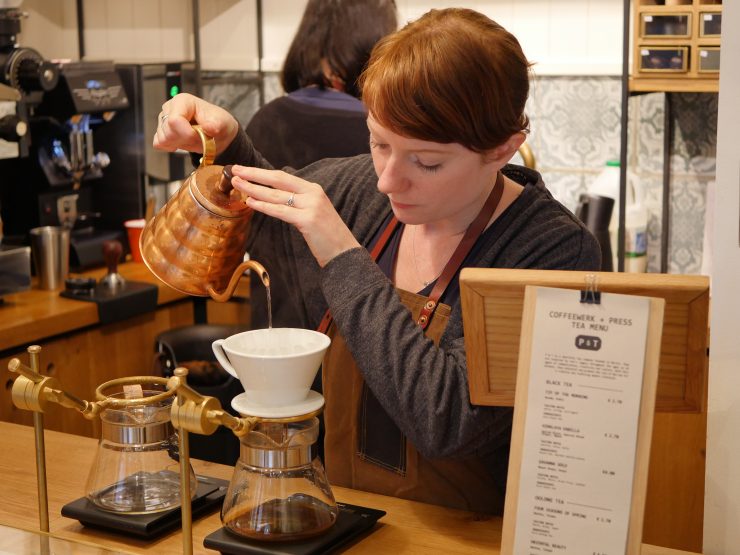
But because specialty coffee is still fairly new to Galway, this world-class lineup doesn’t quite have the pull that it might in Dublin or Amsterdam or New York. Ulrichs hopes that customer-focused events will help grow the specialty community and turn the tide in a city boasting two Michelin-starred restaurants. Coffeewerk is doing its part by regularly hosting meet-ups with folks from La Cabra and Five Elephant, even bringing in former World Barista Champion and Coffee Collective’s head trainer Klaus Thomsen twice last year. And Ulrichs believes it is working. “Specialty coffee is going from strength to strength in Galway, from independent cafes to restaurants starting to work with specialty coffee. There is a real community feeling emerging amongst businesses.”
Even as a leader in Galway’s growing specialty coffee movement, it’s Coffeewerk and Press’s relative obscurity (internationally speaking) that made finding them so exciting. There was no hype, no weeklong anticipation leading up to the visit. There was just me walking down an unknown street, having my interest piqued by a startlingly clean design and my curiosity rewarded with a beautiful cup of coffee.
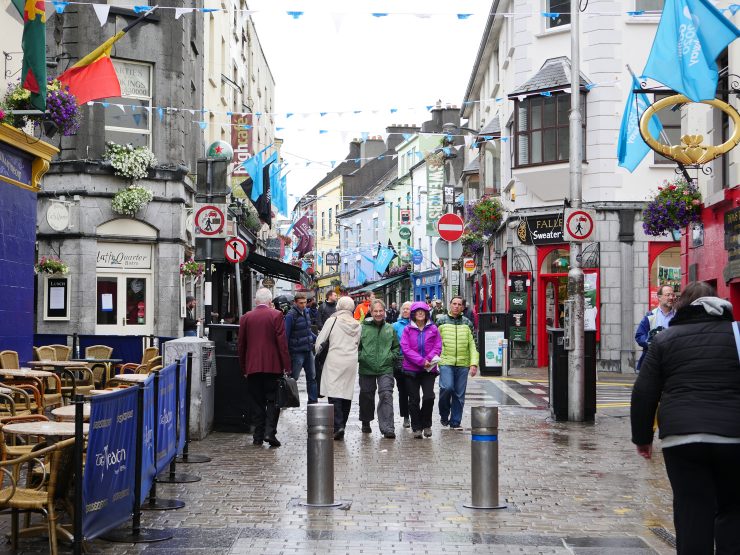
But this creates a dilemma in writing about a place like Coffeewerk. Though an excellent cafe, touting it as such ruins any chance for that serendipitous happening-upon for those who follow in my footsteps. To those visiting Ireland’s west coast that now know of Coffeewerk because of this article, I can only say, “I’m sorry,” and also, “you’re welcome.”
Coffeewerk and Press is located at 4 Quay Street, Galway, Ireland. Follow them on Facebook and Instagram.
Zac Cadwalader is the news editor at Sprudge Media Network.
The post Irish Goes Nordic At Coffeewerk And Press In Galway appeared first on Sprudge.

